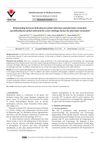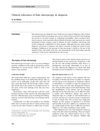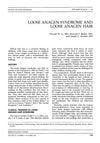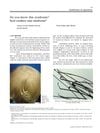 4 citations,
March 2020 in “Turkish Journal of Medical Sciences”
4 citations,
March 2020 in “Turkish Journal of Medical Sciences” There may be a link between Helicobacter pylori infection and the skin condition pityriasis versicolor.
 September 2009 in “Pediatric Dermatology”
September 2009 in “Pediatric Dermatology” UVB is good for a skin condition in Asian kids, a lotion works for head lice, a drug helps with a skin blistering disorder, a foam reduces itchiness in skin inflammation, birthmarks can be more widespread, and criteria for a neurocutaneous disorder were agreed upon.
 14 citations,
March 2014 in “Journal of The American Academy of Dermatology”
14 citations,
March 2014 in “Journal of The American Academy of Dermatology” Symmetrical Acrokeratoderma (SAK) may be a unique skin condition in China, lacking specific treatment and needing long-term monitoring.
 3 citations,
February 2008 in “Basic and clinical dermatology”
3 citations,
February 2008 in “Basic and clinical dermatology” Telogen Effluvium is a hair loss condition where treatment involves identifying and managing its triggers.
 52 citations,
June 1981 in “International Journal of Dermatology”
52 citations,
June 1981 in “International Journal of Dermatology” Oral retinoids are effective for severe skin conditions but require careful use due to side effects.
 26 citations,
March 2014 in “Journal of cutaneous medicine and surgery”
26 citations,
March 2014 in “Journal of cutaneous medicine and surgery” Topical vitamin D is useful for some skin conditions but not effective for others, and more research is needed.
2 citations,
April 2022 in “Genes” The study found that the hair loss condition in Cesky Fousek dogs is influenced by multiple genes affecting skin and muscle structure, fat metabolism, and immunity.
 229 citations,
August 2002 in “Experimental Gerontology”
229 citations,
August 2002 in “Experimental Gerontology” AGA causes hair loss by shrinking hair follicles due to DHT binding, and can be treated with finasteride and minoxidil.
 1 citations,
November 1953 in “Archives of Dermatology”
1 citations,
November 1953 in “Archives of Dermatology” The document discusses various challenging skin conditions and their treatments.
 3 citations,
October 1993 in “The Journal of Dermatology”
3 citations,
October 1993 in “The Journal of Dermatology” The review suggests limited treatments for common hair loss conditions, with potential for future improvements.
 108 citations,
November 1980 in “British Journal of Dermatology”
108 citations,
November 1980 in “British Journal of Dermatology” Oral retinoids are effective for various skin conditions but have side effects and should not be used during pregnancy.
 8 citations,
April 2022 in “The journal of investigative dermatology/Journal of investigative dermatology”
8 citations,
April 2022 in “The journal of investigative dermatology/Journal of investigative dermatology” Certain genetic changes in the LSS gene cause a rare skin and hair condition.
 7 citations,
December 2015 in “International Journal of Dermatology”
7 citations,
December 2015 in “International Journal of Dermatology” New and known mutations in the hairless gene cause a hair loss condition called Atrichia with papular lesions.
44 citations,
April 2013 in “Proceedings of the National Academy of Sciences of the United States of America” FGF13 gene changes cause excessive hair growth in a rare condition.
 7 citations,
December 2008 in “Expert Review of Dermatology”
7 citations,
December 2008 in “Expert Review of Dermatology” The document concludes that various childhood hair and nail disorders exist, some may improve on their own, and advances in genetics and immunology could enhance treatment and counseling.
 August 2016 in “Journal of Investigative Dermatology”
August 2016 in “Journal of Investigative Dermatology” Researchers found a new genetic mutation linked to a hair condition in a Japanese boy.
 1 citations,
December 2005 in “임상약리학회지”
1 citations,
December 2005 in “임상약리학회지” HDMHG0401-10 treatment significantly improved hair count and was better than a placebo in reducing hair loss in men with hereditary hair loss, with no major side effects.
 15 citations,
July 2002 in “Clinical and Experimental Dermatology”
15 citations,
July 2002 in “Clinical and Experimental Dermatology” Hair microscopy is useful for diagnosing certain hair loss conditions but has limitations and must be interpreted carefully.
 25 citations,
October 1996 in “Dermatologic Clinics”
25 citations,
October 1996 in “Dermatologic Clinics” Loose Anagen Syndrome causes easy-to-pull, thin hair, mainly in young girls, and improves with age.
12 citations,
January 2013 in “Indian dermatology online journal” The document reports a unique case of woolly hair with a combination of conditions not previously seen together.
 April 2012 in “Informa Healthcare eBooks”
April 2012 in “Informa Healthcare eBooks” The document concludes that diagnosing hair loss requires evaluating multiple histological features, as no single feature is definitive on its own.
June 2021 in “International journal of cosmetics and dermatology” Vitamin C and E may help with certain skin and hair conditions, but more research is needed to confirm their effectiveness.
2 citations,
June 2021 in “Sultan Qaboos University medical journal” Familial frontal fibrosing alopecia is rare, mostly affects women, and often occurs between sisters or mother-daughter pairs.
 January 2005 in “Translational and Clinical Pharmacology”
January 2005 in “Translational and Clinical Pharmacology” HDMHG0401-10 improves hair loss in men with androgenetic alopecia and has no major side effects.
A hair growth ointment improved hair length in a family with a genetic hair growth condition.
 8 citations,
October 1989 in “International Journal of Dermatology”
8 citations,
October 1989 in “International Journal of Dermatology” Cytochrome P-450 enzymes in the skin help break down various substances and could be targeted to treat skin conditions.
 9 citations,
January 2018 in “International Journal of Trichology”
9 citations,
January 2018 in “International Journal of Trichology” A woman's hair loss from graft versus host disease helps understand similar hair loss conditions.
 38 citations,
December 2012 in “Journal of Cutaneous Pathology”
38 citations,
December 2012 in “Journal of Cutaneous Pathology” EVG staining is a valuable, simple, and cost-effective method for diagnosing various skin conditions in dermatopathology.

The document concludes that Loose Anagen Hair Syndrome is a benign condition where hair is thin and easily pulled out, often improving with age.
 4 citations,
January 2015 in “Türk Patoloji Dergisi”
4 citations,
January 2015 in “Türk Patoloji Dergisi” Hormone imbalances from endocrine diseases can cause various skin conditions that help diagnose and treat these diseases early.























